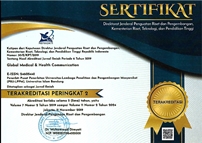Effect of Internet Self-Efficacy on the Adherence of Middle Adulthood M-health Users with Online Trust Behavior as a Mediator Variable
Abstract
Adherence to treatment regimens is a significant challenge faced by patients with chronic illnesses and healthy individuals, including through m-Health—a new model of remote health delivery via mobile phones. Middle-aged adults often need more internet skills, especially concerning internet self-efficacy and online trust behavior in health services. This study aims to elucidate the relationship between internet self-efficacy and adherence to medical advice among middle-aged m-Health users, mediated by online trust behavior. A cross-sectional study was conducted from 4 July to 4 September 2022, involving 214 respondents selected through convenient sampling from various cities and regencies in Indonesia. Data were collected using online forms distributed to the participants. The statistical analysis employed a structural equation model (SEM) with the LISREL version 8.7. The results showed a chi-square value of 438.61, df=187, p=0.00000, RMSEA=0.079, NFI=0.93, NNFI=0.95, CFI=0.95, and IFI=0.95. These findings indicate that online trust behavior successfully mediates the relationship between internet self-efficacy and adherence. However, internet self-efficacy does not directly affect adherence. This means that adherence will increase when trust in health services.
Keywords
Full Text:
PDFReferences
Madanian S, Parry DT, Airehrour D, Cherrington M. mHealth and big-data integration: promises for healthcare system in India. BMJ Health Care Inform. 2019;26(1):e100071.
Gonçalves-Bradley DC, J Maria AR, Ricci-Cabello I, Villanueva G, Fønhus MS, Glenton C, et al. Mobile technologies to support healthcare provider to healthcare provider communication and management of care. Cochrane Database Syst Rev. 2020;8(8):CD012927.
McCool J, Dobson R, Whittaker R, Paton C. Mobile health (mHealth) in low- and middle-income countries. Annu Rev Public Health. 2022;43:525–39.
Abaza H, Marschollek M. mHealth application areas and technology combinations. A comparison of literature from high and low/middle income countries. Methods Inf Med. 2017;56(7):e105–22.
Anglada-Martinez H, Riu-Viladoms G, Martin-Conde M, Rovira-Illamola M, Sotoca-Momblona JM, Codina-Jane C. Does mHealth increase adherence to medication? Results of a systematic review. Int J Clin Pract. 2015;69(1):9–32.
Ulya FK, Setiawan SRD. Survei: 84,4 persen masyarakat puas dengan layanan kesehatan digital [Internet]. Jakarta: KOMPAS.com; 2019 [cited 2020 July 5]. Available from: https://money.kompas.com/read/2019/08/19/134000926/survei--84-4-persen-masyarakat-puas-dengan-layanan-kesehatan-digital?
Meng F, Guo X, Peng Z, Lai KH, Zhao X. Investigating the adoption of mobile health services by elderly users: trust transfer model and survey study. JMIR Mhealth Uhealth. 2019;7(1):e12269.
Silalahi RV, Hartono N, Tumpak MA. Profile and preferences users of doctors consultation application in Indonesia. IOP Conf Ser Earth Environ Sci. 2018;195:012069.
McKnight DH, Choudhury V, Kacmar C. The impact of initial consumer trust on intentions to transact with a web site: a trust building model. J Strateg Inf Syst. 2002;11(3–4):297–323.
Lin YC, Liang JC, Yang CJ, Tsai CC. Exploring middle-aged and older adults’ sources of internet self-efficacy: a case study. Comput Hum Behav. 2013;29(6):2733–43.
Chu RJC. How family support and internet self-efficacy influence the effects of e-learning among higher aged adults–analyses of gender and age differences. Comput Educ. 2010;55(1):255–64.
Isaac O, Abdullah Z, Ramayah T, Mutahar AM. Internet usage within government institutions in Yemen: an extended technology acceptance model (TAM) with internet self-efficacy and performance impact. Sci Int (Lahore). 2017;29(4):737–47.
Eastin MS, LaRose R. Internet self-efficacy and the psychology of the digital divide. J Comput Mediat Comm [Internet]. 2000 [cited 2020 August 10];6(1):JCMC611. Available from: https://academic.oup.com/jcmc/article/6/1/JCMC611/4584219.
Bandura A, Freeman WH, Lightsey R. Self-efficacy: the exercise of control. J Cogn Psychother. 1999;13(2):158–66.
Effendy N. Konsep flourishing dalam psikologi positif: subjective well-being atau berbeda. In: Hajazi MZH, Latipun, Iswinarti, editors. Prosiding Seminar ASEAN Psikologi dan Kemanusiaan; 2016 February 19–20; Malang, Indonesia. Malang: UMM Press; 2016 [cited 2020 September 5]. p. 326–33. Available from: https://mpsi.umm.ac.id/files/file/326-333%20nurlaila%20efendy.pdf.
Williams GC, Grow VM, Freedman ZR, Ryan RM, Deci EL. Motivational predictors of weight loss and weight-loss maintenance. J Pers Soc Psychol. 1996;70(1):115–26.
McKnight DH, Chervany NL. What trust means in e-commerce customer relationships: an interdisciplinary conceptual typology. IJEC. 2001;6(2):35–59.
Hisyam A. Aplikasi metode structural equation modeling dengan LISREL 8.72 [Internet]. Berlin: ResearchGate; 2021 [cited 2021 January 20]. Available from: https://www.researchgate.net/publication/349338711_Aplikasi_Metode_Structural_Equation_Modeling_Dengan_LISREL_872.
Sugiyono. Metode penelitian kuantitatif, kualitatif, dan R&D. 28th printing. Bandung: Alfabeta; 2019.
Martela F, Riekki TJJ. Autonomy, competence, relatedness, and beneficence: a multicultural comparison of the four pathways to meaningful work. Front Psychol. 2018;9:1157.
Akhter SA. Privacy concern and online transactions: the impact of internet self-efficacy and internet involvement. J Consum Mark. 2014;31(2):118–25.
Kruk ME, Gage AD, Arsenault C, Jordan K, Leslie HH, Roder-DeWan S, et al. High-quality health systems in the Sustainable Development Goals era: time for a revolution. Lancet Glob Health. 2018;6(11):e1196–252.
Dhagarra D, Goswami M, Kumar G. Impact of trust and privacy concerns on technology acceptance in healthcare: an Indian perspective. Int J Med Inform. 2020;141:104164.
Chong YY, Chien WT, Cheng HY, Chow KM, Kassianos AP, Karekla M, et al. The role of illness perceptions, coping, and self-efficacy on adherence to precautionary measures for COVID-19. Int J Environ Res Public Health. 2020;17(18):6540.
DOI: https://doi.org/10.29313/gmhc.v11i1.11078
pISSN 2301-9123 | eISSN 2460-5441
Visitor since 19 October 2016:
Global Medical and Health Communication is licensed under a Creative Commons Attribution-NonCommercial-ShareAlike 4.0 International License.































.png)
_(1).png)
_(1).jpg)
